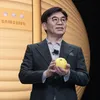Samsung Electronics estimates Q4 operating profit down by 34 pc
In an earnings guidance statement, it projected operating profits in the October to December period at 7.1 trillion won, down 34.2 percent year-on-year.
Samsung Electronics' operating profits fell by more than a third in the fourth quarter, the world's biggest manufacturer of smartphones and memory chips estimated Wednesday.
In an earnings guidance statement, it projected operating profits in the October to December period at 7.1 trillion won, down by 34.2 percent year-on-year.
Sales were forecast to be flat at 59 trillion won, it added.
Samsung has been assailed by a series of difficulties in 2019, with chip stockpiles bloated and prices falling, in contrast to the booming market of previous years.

Source: Shutterstock
The premium smartphone market has also grown fiercely competitive with buyers waiting longer before upgrading to new models.
But the figures represent a relative improvement -- in each of the first three quarters of 2019 net profits fell by more than half year-on-year.
Samsung withholds net profit and sector-by-sector business performance until it releases its final earnings report, which is expected later this month.
Earlier this week, at CES 2020, Samsung unveiled the latest advances in robotics, artificial intelligence (AI), 5G, edge computing, and augmented reality (AR), as it laid out its vision for a new decade it termed the “Age of Experience”.
At the event, Samsung said that it will focus on human-centric innovations that allow the creation of rich, “personalised experiences” that make consumers’ lives more convenient, enjoyable, and meaningful.
Unveiling the company’s vision of robots as ‘life companions’, Samsung Consumer Electronics President and CEO HS Kim introduced a small, robot personal assistant called Ballie that is designed to understand and support a customer's needs by being proactively helpful around the house.
Ballie’s on-device AI capabilities allow it to be a fitness assistant and a mobile interface that works to solve consumers’ changing needs, doing all this while ensuring strict data protection and privacy standards, Samsung said.
“We believe AI is the future of personalised care… On-device AI (like the one used in Ballie) puts you in control of your information and protects your privacy, while still delivering the power of personalisation,” said Sebastian Seung, Executive Vice President and Chief Research Scientist at Samsung Electronics.
Samsung’s Ballie can interact with other smart devices, and in Samsung’s demo video about the robot, is seen interacting with the TV, as well as with a smart vacuum cleaner.
(Disclaimer: Additional background information has been added to this PTI copy for context)









